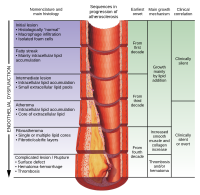
Photo from wikipedia
A 75-year-old man receiving treatment for necrotizing pancreatitis developed septic disseminated intravascular coagulation and acute coronary syndrome (ACS). During percutaneous coronary intervention (PCI), a large amount of fresh thrombi appeared… Click to show full abstract
A 75-year-old man receiving treatment for necrotizing pancreatitis developed septic disseminated intravascular coagulation and acute coronary syndrome (ACS). During percutaneous coronary intervention (PCI), a large amount of fresh thrombi appeared after balloon dilatation for the ACS-culprit lesion. Given the low plasma AT activity and poorly prolonged activated clotting time (ACT), we suspected that acquired AT deficiency-related heparin resistance (HR) was responsible for the thrombus formation. Administration of AT gamma markedly improved ACT, and we successfully completed PCI. We suggest that AT gamma be considered a treatment option for AT deficiency-related HR and subsequent intraprocedural thrombotic events.
Journal Title: Internal medicine
Year Published: 2022
Link to full text (if available)
Share on Social Media: Sign Up to like & get
recommendations!